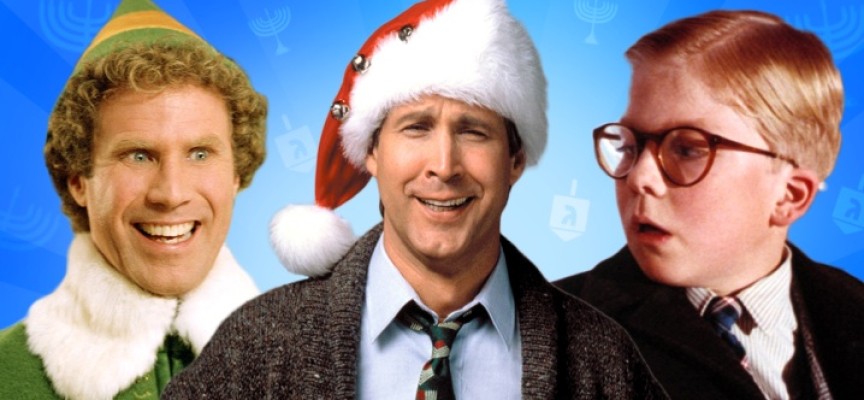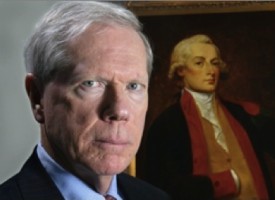HAPPY HANUKKAH & MERRY CHRISTMAS – MOVIES THAT WE CAN ENJOY TOGETHER
DECIDER: BY Michael Liss
Each Christmas Day, my family would gather to celebrate the birth of someone who played a very important role in our lives: My grandmother. Her birthday is December 26, and since we’re Jewish, it was by far the easiest time to get everyone together (no scheduling conflicts!). And besides, what else were we going to do that day?
Growing up in the Boston ‘burbs, many of my friends celebrated Christmas, and of course we were completely surrounded by it culturally. We had one family tradition, piling into the back of my dad’s car to drive around looking at lights. In school chorus we’d sing the usual seasonal hits, and some years I’d head up the street to help my friend’s family decorate their tree. But part of why Kyle singing “A Jew on Christmas” on South Park is so funny is because it’s so acutely observed; Christmas felt like something that happened everywhere around you, but not to you. In our contemporary, diverse (and largely secular) society, if there was one thing that made you feel “other,” it was Christmas.
But what about Christmas movies? They play a huge role in the pop culture firmament, and some are very good. Should Jews avoid them like an Old Testament plague, or is okay to get excited by some each year? Does embracing holiday movies alleviate part of our seasonal displacement, or reflect back on it? And what about the identity confusion of growing up on specials like Rudolph and the original Grinch Who Stole Christmas, fully aware that it’s not your holiday being stolen? What is an appropriate relationship between American Jews and the Christmas movies so unavoidable this time of year?
Oy. So many questions. So like any good Jewish boy, I asked a rabbi.
“I do feel there are movies which might not be meaningful for most Jews, particularly movies which rely on the religious themes of Christmas,” says Rabbi Darcie Crystal, a rabbi at Tamid: The Downtown Synagogue. “However, as an American, there are many films I grew up with — A Christmas Story, for instance — which may be set over Christmas or rely on imagery of Christmas celebrations, but embody universal messages and themes that we can all appreciate.”
She notes that American Jews are “full participants in modern society. Our pop culture, which includes classic Christmas movies, Christmas songs (many, in fact written by Jews), and traditions, are part of the American civil religion. These elements do not necessarily connect to one faith or another in a religious way, but have become imbued with deep meaning in our society.”
To Rabbi Crystal, the appropriate balance is struck when American Jews appreciate and preserve their own holidays while also respecting those of their neighbors. She says it’s about maintaining “the tremendous pluralism of faith and culture in this country,” while appreciating each other’s contributions. “If together we can laugh, cry, or be moved by a movie and appreciate its universal value, then there is no harm, and in fact, perhaps there is benefit, to sharing in something festive during this holiday season.”
If it’s okay to enjoy certain holiday movies as an American Jew, then, how do you determine what make the cut? Obviously a great movie is a great movie, regardless of its themes or context. And a bad movie still sucks no matter how much Christmas spirit it’s over-stuffed with. But beyond that, what makes one Christmas movie kosher for Jews but another something I wouldn’t touch with a 20-foot Festivus pole?
In some ways it’s easier to identify what keeps a movie off the list. If it could ever wind up on Lifetime, Oxygen or the Hallmark Channel? No. If Christmas sweaters are worn without being a comment on the character (I’m looking at you, Clark Griswold)? Nope. If it’s marketed as “A Very Special ___” or something that will “Make You Believe”? Hell no. It has to stay on the right side of sentimentality vs. schmaltzy. Telling the nativity story or exploring overtly religious themes is an obvious no-go. No unexplained Christmas “miracles” and preferably no angels. And preferably it doesn’t take place in a universe where Santa is real.
So what does work? It comes down to relatability. If it’s too specific to the Christmas experience, we’re left out (and likely disinterested to start with). But if it’s about broader themes, broader drama or comedy, something with universal truths that don’t run out with the Advent calendar – something we can see ourselves in, just maybe wearing less red and green – it could be worth spinning the dreidel on.
Though it certainly helps if the movie is actually good.
'A Christmas Story'
What other movie has inspired its own lamp craze, a museum and an annual 24-hour television marathon that’s been running for 18 years? While A Christmas Story is one of the most beloved holiday movies, it’s actually not overwhelmingly Christmas-y. Yes, it centers on Ralphie’s obsession with getting a Red Ryder air rifle for a present, but anyone can relate to dying for that one toy they just had to have.
Really the movie is about nostalgia, coming of age, facing bullies, getting triple-dog-dared, fantasizing about revenge and being a grown up, having your mouth washed out with soap, watching your dad fight through household repairs and discovering all the ways your family, despite its eccentricities, truly loves one another.
Plus, A Christmas Story ends like every Jewish Christmas does. If it took place in my town, the Parkers would have found themselves waiting at the Chinese restaurant behind half of my temple. [Watch A Christmas Story]
'It's A Wonderful Life'
This is where the “no angels” preference bends. It’s a Wonderful Life didn’t become a holiday staple until the 1970s, when its copyright was mistakenly not renewed and TV stations put it in heavy rotation. For all its famous sentimentality, the movie is darker than people may remember. Only intervention by a guardian angel and a bleak vision of what his town would be like if he’d never existed bring George Bailey back from the brink of despair.
A story of trying to do right by your small town, of dreams deferred and hope nearly lost, the movie examines the values and ideals of post-war America. Its central tension between the greed of heartless businesses and the lofty desire to genuinely help and care about the customers you serve will always be relevant. [Watch It’s a Wonderful Life]
'National Lampoon’s Christmas Vacation'
Bickering in-laws. Yuppie neighbors. Horrible bosses. Blinding light displays that short-circuit the grid. Sexy department store lingerie saleswomen. Gift-wrapped cats. Loose squirrels. Glass moose mugs. SWAT team invasions. Sewage explosions. This is how I imagine every family Christmas in the ‘burbs. [Watch National Lampoon’s Christmas Vacation]
'Scrooged'
Yes, this is squarely a Christmas movie. But it’s based on the most famous Christmas story not found in the bible. There is a reason A Christmas Carol has remained immensely popular for 170 years and has been repeatedly adapted in every medium that comes along. That’s because the story of one man learning not to be an asshole is eminently universal. And when that man is Bill Murray, even better.
Scrooged is Dickens for the television age. Murray plays an ambitious network president who was raised by TV; he can’t differentiate his own memories from childhood shows. His character Frank sees Christmas as a ratings opportunity to win (this was the height of the ’80s, after all), and produces a live production of Carol on Christmas Eve. It culminates in Frank going reverse-Network, giving a rambling, improvised speech on live TV in which he finally embraces the spirit of the season. The ending momentarily goes from sentimental to as close to schmaltzy as a Bill Murray movie can get. But this is a Bill Murray movie. And he sells the hell out of the final scene.
Bonus points: Murray’s line, “The Jews taught me this great word, schmuck. I was a schmuck. And now I’m not a schmuck.” See, the whole movie’s already been translated for your uncle. [Watch Scrooged]
'Die Hard' and 'Gremlins'
You may not put these ‘80s stalwarts on a list of traditional Christmas fare, but Gremlins does set its blend of horror and comedy over the holidays, and it’s a Christmas present that causes all hell to break loose (take that, rampant holiday commercialism!). And all John McClane wants to do in Die Hard is stop the attack on his wife’s office building (where she’s attending a holiday party) so he can spend Christmas with his estranged family.
Besides, do the Gremlins remind me of my Jewish grandfather, with their rascally personalities, floppy ears jutting out like wings and over-exaggerated eyebrows? Yup. (John McClane? Okay. Not so much.) [Watch Gremlins and Die Hard.
TO READ MORE: http://decider.com/2014/12/21/rabbi-approved-christmas-movies-that-are-kosher-for-jews/












